上海牛津版七年级上册unit2知识点讲解
- 格式:docx
- 大小:32.29 KB
- 文档页数:10
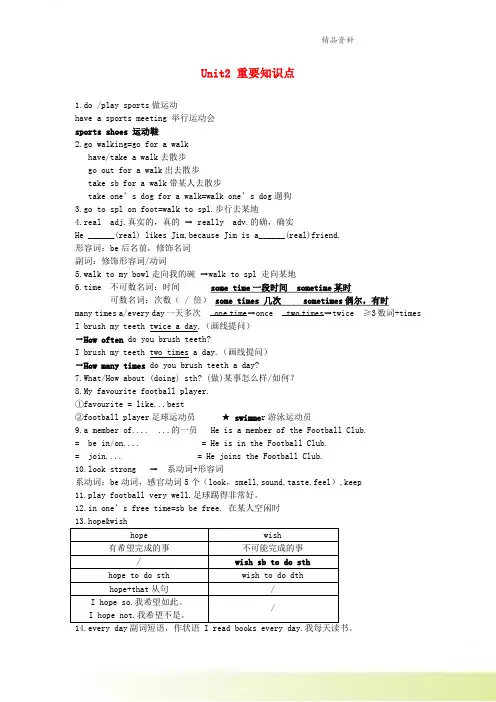
Unit2 重要知识点1.do /play sports做运动have a sports meeting 举行运动会sports shoes 运动鞋2.go walking=go for a walkhave/take a walk去散步go out for a walk出去散步take sb for a walk带某人去散步take one’s dog for a walk=walk one’s dog遛狗3.go to spl on foot=walk to spl.步行去某地4.real adj.真实的,真的➡ really adv.的确,确实He ______(real) likes Jim,because Jim is a______(real)friend.形容词:be后名前,修饰名词副词:修饰形容词/动词5.walk to my bowl走向我的碗➡walk to spl 走向某地6.time 不可数名词:时间some time一段时间 sometime某时可数名词:次数( / 倍)some times 几次 sometimes偶尔,有时many times a/every day一天多次 one time➡once two times➡twice ≥3数词+times I brush my teeth twice a day.(画线提问)➡How often do you brush teeth?I brush my teeth two times a day.(画线提问)➡How many times do you brush teeth a day?7.What/How about (doing) sth? (做)某事怎么样/如何?8.My favourite football player.①favourite = like...best②football player足球运动员★swimme r游泳运动员9.a member of.... ...的一员 He is a member of the Football Club.= be in/on.... = He is in the Football Club.= join.... = He joins the Football Club.10.look strong ➡系动词+形容词系动词:be动词,感官动词5个(look,smell,sound,taste,feel),keep11.play football very well.足球踢得非常好。

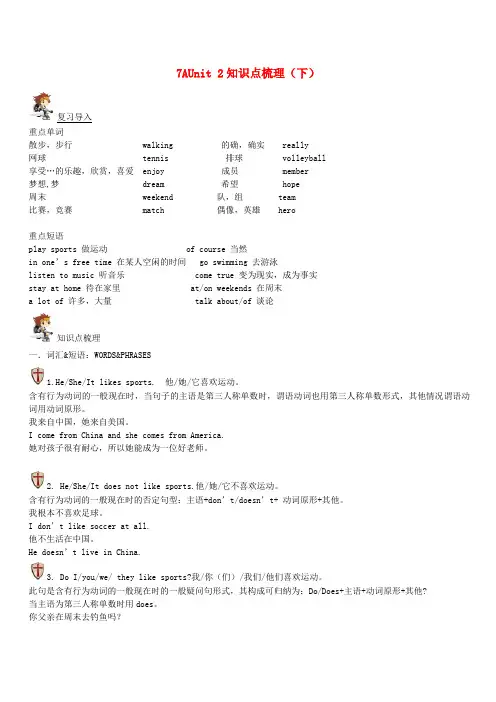
7AUnit 2知识点梳理(下)复习导入重点单词散步,步行 walking 的确,确实 really网球 tennis 排球 volleyball享受…的乐趣,欣赏,喜爱 enjoy 成员 member梦想,梦 dream 希望 hope周末 weekend 队,组 team比赛,竞赛 match 偶像,英雄 hero重点短语play sports 做运动 of course 当然in one’s free time 在某人空闲的时间 go swimming 去游泳listen to music 听音乐 come true 变为现实,成为事实stay at home 待在家里 at/on weekends 在周末a lot of 许多,大量 talk about/of 谈论知识点梳理一.词汇&短语:WORDS&PHRASES1.He/She/It likes sports. 他/她/它喜欢运动。
含有行为动词的一般现在时,当句子的主语是第三人称单数时,谓语动词也用第三人称单数形式,其他情况谓语动词用动词原形。
我来自中国,她来自美国。
I come from China and she comes from America.她对孩子很有耐心,所以她能成为一位好老师。
2. He/She/It does not like sports.他/她/它不喜欢运动。
含有行为动词的一般现在时的否定句型:主语+don’t/doesn’t+ 动词原形+其他。
我根本不喜欢足球。
I don’t like soccer at all.他不生活在中国。
He doesn’t live in China.3. Do I/you/we/ they like sports?我/你(们)/我们/他们喜欢运动。
此句是含有行为动词的一般现在时的一般疑问句形式,其构成可归纳为:Do/Does+主语+动词原形+其他?当主语为第三人称单数时用does。
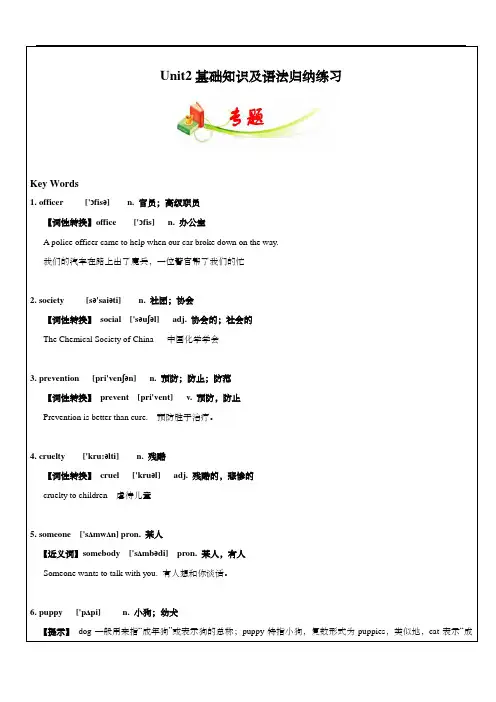
Unit2基础知识及语法归纳练习Key Words1. officer ['ɔfisə] n. 官员;高级职员【词性转换】office ['ɔfis] n. 办公室A police officer came to help when our car broke down on the way.我们的汽车在路上出了魔兵,一位警官帮了我们的忙2. society [sə'saiəti] n. 社团;协会【词性转换】social ['səuʃəl] adj. 协会的;社会的The Chemical Society of China 中国化学学会3. prevention [pri'venʃən] n. 预防;防止;防范【词性转换】prevent [pri'vent] v. 预防,防止Prevention is better than cure. 预防胜于治疗。
4. cruelty ['kru:əlti] n. 残酷【词性转换】cruel ['kruəl] adj. 残酷的,悲惨的cruelty to children 虐待儿童5. someone ['sʌmwʌn] pron. 某人【近义词】somebody ['sʌmbədi] pron. 某人,有人Someone wants to talk with you. 有人想和你谈话。
6. puppy ['pʌpi] n. 小狗;幼犬【提示】dog一般用来指“成年狗”或表示狗的总称;puppy特指小狗,复数形式为puppies,类似地,cat表示“成take care of 照看;照料;照顾(=look after)be unkind to 对……不友善的be kind to 对……友善的save…from… 挽救……以免于……keep…from… 保护;使免受play with sb. 跟某人玩耍help sb. (to) do sth 帮某人做某事on the farm 在农场上Grammar1. 一般过去时:★一般过去时的构成:一般过去时用动词的过去式表示,动词的过去式有规则与不规则两种。
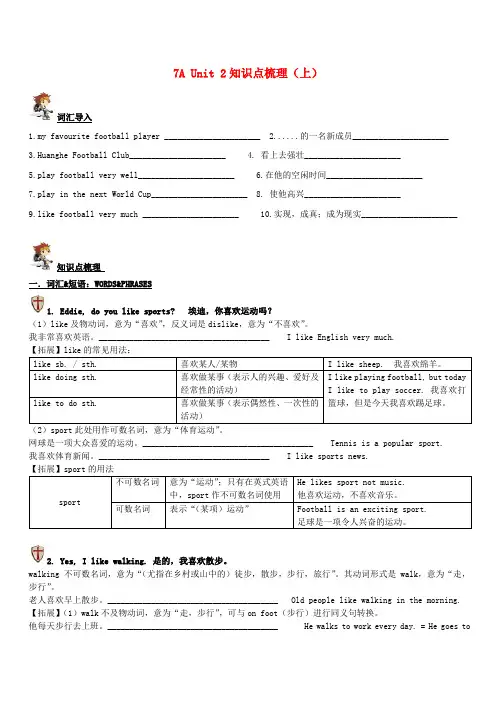
7A Unit 2知识点梳理(上)词汇导入1.my favourite football player ______________________2......的一名新成员______________________3.Huanghe Football Club______________________4. 看上去强壮______________________5.play football very well______________________6.在他的空闲时间______________________7.play in the next World Cup______________________ 8. 使他高兴______________________9.like football very much ______________________ 10.实现,成真;成为现实______________________知识点梳理一.词汇&短语:WORDS&PHRASES1. Eddie, do you like sports? 埃迪,你喜欢运动吗?(1)like及物动词,意为“喜欢”,反义词是dislike,意为“不喜欢”。
我非常喜欢英语。
_______________________________________ I like English very much.【拓展】like的常见用法:like sb. / sth. 喜欢某人/某物I like sheep. 我喜欢绵羊。
like doing sth. 喜欢做某事(表示人的兴趣、爱好及经常性的活动)I like playing football, but today I like to play soccer. 我喜欢打篮球,但是今天我喜欢踢足球。
like to do sth. 喜欢做某事(表示偶然性、一次性的活动)(2)sport此处用作可数名词,意为“体育运动”。
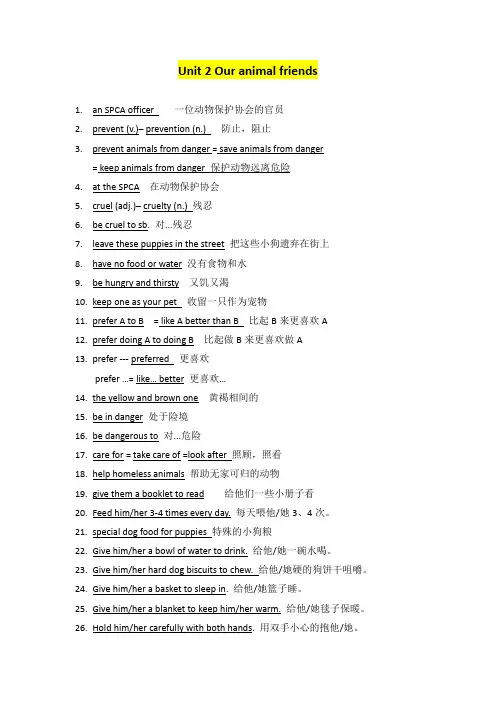
Unit 2 Our animal friends1.an SPCA officer 一位动物保护协会的官员2.prevent (v.)– prevention (n.) 防止,阻止3.prevent animals from danger = save animals from danger= keep animals from danger 保护动物远离危险4.at the SPCA 在动物保护协会5.cruel (adj.)– cruelty (n.) 残忍6.be cruel to sb. 对...残忍7.leave these puppies in the street 把这些小狗遗弃在街上8.have no food or water 没有食物和水9.be hungry and thirsty 又饥又渴10.keep one as your pet 收留一只作为宠物11.prefer A to B = like A better than B 比起B来更喜欢A12.prefer doing A to doing B 比起做B来更喜欢做A13.prefer --- preferred 更喜欢prefer …= like… better 更喜欢…14.the yellow and brown one 黄褐相间的15.be in danger 处于险境16.be dangerous to 对...危险17.care for = take care of =look after 照顾,照看18.help homeless animals 帮助无家可归的动物19.give them a booklet to read 给他们一些小册子看20.Feed him/her 3-4 times every day. 每天喂他/她3、4次。
21.special dog food for puppies 特殊的小狗粮22.Give him/her a bowl of water to drink. 给他/她一碗水喝。
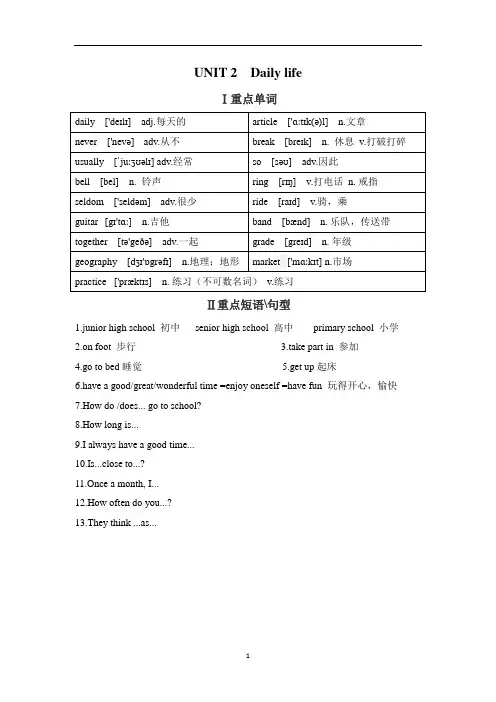
UNIT 2 Daily life1.junior high school 初中senior high school 高中primary school 小学2.on foot 步行3.take part in 参加4.go to bed睡觉5.get up起床6.have a good/great/wonderful time =enjoy oneself =have fun 玩得开心,愉快7.How do /does... go to school?8.How long is...9.I always have a good time...10.Is...close to...?11.Once a month, I...12.How often do you...?13.They think ...as...III详细讲解1. once or twice a week每周一两次注意:在英语中,表示一次用“once”,两次用“twice”,表示三次或者三次以上就用“基数词+times”(time在这里是可数名词,表示次数,需要加“s”)如:once a week,twice a week, three(four/ five…)times a week2. brush one’s teeth刷牙brush ①在这里是动词,表示“刷”②n.可数名词,“刷子”复数形式是“ brushes”。
如:I need some brushes for painting. tooth的复数形式是“ teeth”牙齿(因为每个人刷牙的时候不止刷一颗牙齿,所以要用复数)3.watch television= watch TV 看电视4.ride a bicycle 骑自行车动词短语,交通工具前要加限定词(如a ,the)同义词:by bicycle/bike 介词短语,交通工具前不用加限定词5.be close to 离……近= near =beside= not far away from(上节课学过)6.so在此处用作连词,表示结果“因此;所以”的意思。
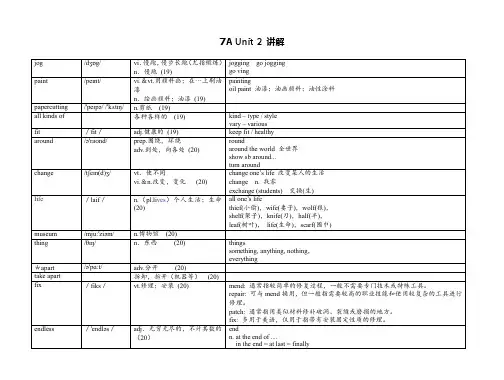
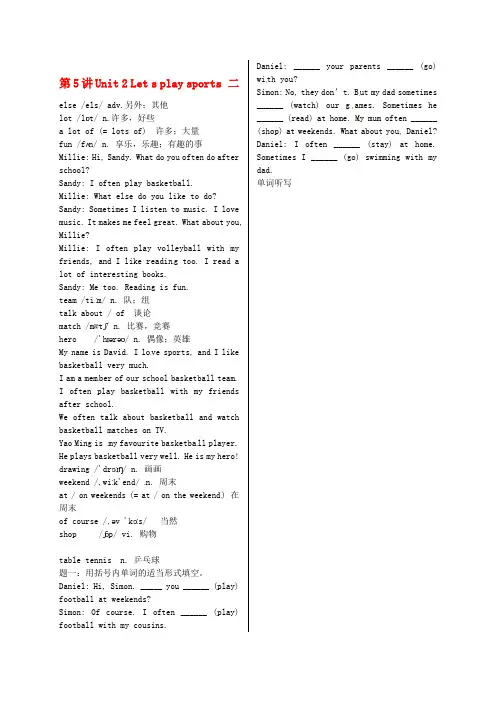
第5讲Unit 2 Let s play sports 二else /els/ adv.另外;其他lot /lɒt/ n.许多,好些a lot of (= lots of) 许多;大量fun /fʌn/ n. 享乐,乐趣;有趣的事Millie: Hi, Sandy. What do you often do after school?Sandy: I often play basketball.Millie: What else do you like to do? Sandy: Sometimes I listen to music. I love music. It makes me feel great. What about you, Millie?Millie: I often play volleyball with my friends, and I like readin g too. I read a lot of interesting books.Sandy: Me too. Reading is fun.team /tiːm/ n. 队;组talk about / of 谈论match /mætʃ/ n. 比赛,竞赛hero /'hɪərəʊ/ n. 偶像;英雄My name is David. I lo ve sports, and I like basketball very much.I am a mem ber of our school basketball team.I often play basketball with my friends after school.We often talk about basketball and watch basketball matches on TV.Yao Ming is my favourite basketba ll player. He plays basketball very well. He is my hero! drawing /'drɔːɪŋ/ n. 画画weekend /,wiːk'end/ n. 周末at / on weekends (= at / on the weekend) 在周末of course /,əv 'kɔːs/ 当然shop /ʃɒp/ vi. 购物table tennis n. 乒乓球题一:用括号内单词的适当形式填空。
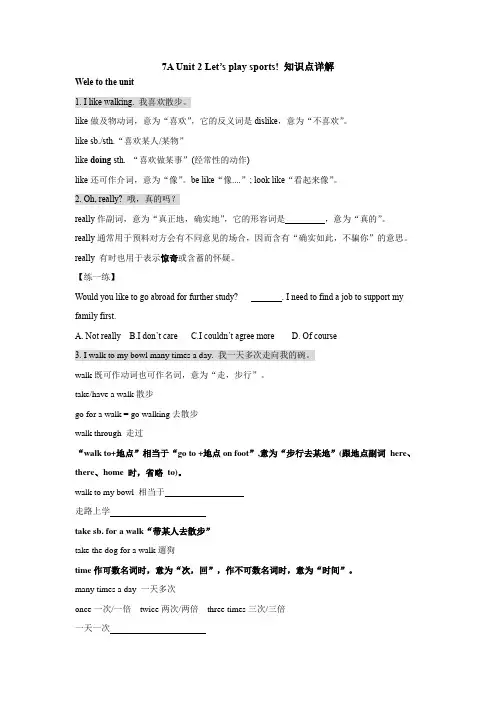
7A Unit 2 Let’s play sports! 知识点详解Wele to the unit1. I like walking. 我喜欢散步。
like做及物动词,意为“喜欢”,它的反义词是dislike,意为“不喜欢”。
like sb./sth.“喜欢某人/某物”like doing sth. “喜欢做某事”(经常性的动作)like还可作介词,意为“像”。
be like“像....”; look like“看起来像”。
2. Oh, really? 哦,真的吗?really作副词,意为“真正地,确实地”,它的形容词是,意为“真的”。
really通常用于预料对方会有不同意见的场合,因而含有“确实如此,不骗你”的意思。
really 有时也用于表示惊奇或含蓄的怀疑。
【练一练】Would you like to go abroad for further study? . I need to find a job to support my family first.A. Not reallyB.I don’t careC.I couldn’t agree moreD. Of course3. I walk to my bowl many times a day. 我一天多次走向我的碗。
walk既可作动词也可作名词,意为“走,步行”。
take/have a walk散步go for a walk = go walking去散步walk through 走过“walk to+地点”相当于“go to +地点on foot”,意为“步行去某地”(跟地点副词here、there、home 时,省略to)。
walk to my bowl 相当于走路上学take sb. for a walk“带某人去散步”take the dog for a walk遛狗time作可数名词时,意为“次,回”,作不可数名词时,意为“时间”。

Unit 2 Our animal friendsRead the text and answer the questions above the text.Q1. What do unkind people do to their pets?___________________________________________________________ Q2. What do SPCA officiers do to save animals?___________________________________________________________ Q3. What must people promise to do when they get a pet from SPCA?___________________________________________________________ Q4. How does the SPCA take care of sick animals?___________________________________________________________一、单词二、句型1.I prefer the black one.①prefer+n _____________.—Which one do you like better? Chicken or fish?—I ________meat.②prefer A to B ____________eg. _______________________________________.在狗与猫之间我更喜欢狗。
_______________________________________.大多数人愿意坐火车而不愿坐汽车。
③Prefer doing to doing =________________________ 宁愿...也不I prefer sleeping at home to having a picnic.(同义句转换)= ___________________________________________________.我宁愿在家睡觉也不愿去野餐。
Unit2词汇讲义拓展学习法shop英 [ʃɒp]美 [ʃɑ:p]第三人称单数:shops第三人称复数:shops现在分词:shopping过去分词:shopped过去式:shoppedshop 基本解释名词商店; 购物; 工厂; 办事处及物/不及物动词(到…)去买东西[购物]; 逛商店及物动词购物; 买东西shop 相关词组1. all over the shop : 到处;2. sink the shop : 不谈论本行的事;3. shop around : 逐店进行搜购, 到处寻找好职业, 到处寻找好主意;4. tend shop : 招待顾客;5. talk shop : 三句话不离本行;6. set up shop : 开店;shop 相关例句不及物动词Unit2词汇讲义拓展学习法1. We shopped all morning for new coats.整个上午我们都在买新衣服。
2. Lora has gone shopping.劳拉买东西去了。
int.1. Shop !喂!有没有人!名词1. My father works in a carpenter's shop.我父亲在木工厂工作。
2. Soon they got back to shop.不一会他们回到与本行有关的话题上去了。
shop 情景对话起床A:It’s time to get up!该起床了!B:I just went to bed!我刚刚睡下。
Unit2词汇讲义拓展学习法A:You shouldn’t have stayed up so late watching TV. I told you we had to get an early start.你不该夜里看电视看得那么晚。
我告诉过你我们得清早动身。
B:I know, but that movie was just too good to leave. I guess I’ll just have to pay the price and be sleepy.我知道。
Unit 2:一、重点词汇梳理1.daily 日常的【考点】同义词 = everyday2.never 从不3.ride 骑;驾驶【考点】过去式: rode4.seldom 不常;很少【考点】同义词 = not often5.break 休息;打破【考点】 1. V 表示打破,过去式 broke2.n 表示休息, have a break = have a rest 6.ring 发出声音【考点】 1. 同义词 = make a sound2. 过去式 rang7.end 结束【考点】同义词 = stop8.practice 练习【考点】 1. practice 后接动词,需用doing 形式9. together 在一起【考点】同义词 = with each other10.walk to sw 步行去某地 = go to sw on foot.11.take part in 参加【考点】同义短语= join in112. have a good time玩得开心【考点】同义词组= enjoy oneself / have fun13. enjoy 享受【考点】 1. enjoy 后接动词,需用 doing 形式2. enjoy后接代词,需用反身代词enjoy oneself = have a good time 【同步习题】一、单选题( ) 1. When the bell rings, we often go outside to play.A. makes a soundB. breaksC. makes no sound( ) 2. My morning classes end at 11:30 a.m.A. beginB. findC. stop( ) 3. We often go to the park together because we are good friends.A. quicklyB. with each otherC. happily( ) 4. It ’ s timehavetoa break. Let ’ s play outside.A. have a walkB. have a restC. go to sleep( ) 5. She always gets up early and is seldom late.A. oftenB. alwaysC. not often( )6. I had a good time during the summer holiday.A. enjoyed myselfB. had free timeC. was busy( ) 7. Danny took part in the English club yesterday.A. took inB. joined inC. left( ) 8. In her spare time, she enjoys reading books or going to the park.( ) 9. To________a plan means to begin a plan.A. takeB. workC. start2( ) 10. A________ is a period(时期 ) of time when people stop working to have a rest【.来源: 21·世纪A. lookB. breakC. trip( ) 11. If someone____ doing something, that is to say, he or she likes doing something very much世A. enjoysB. hatesC. finishes( ) 12. The students ’ ________life in school is wonderful(精彩的 ) so they like very much2-1-c-n-j-yA. littleB. difficultC. daily( ) 13. Lucy's letters often ________ with the words “ See you soon."A. endB. followC. start( )14. —Do you usually go to school on foot?—Yes, but sometimes I ______ my bicycle.A. rideB. practiceC. walk15. --- Lily, I will go to Hainan for a holiday.---- _____A. Good luckB. You are welcomeC. Have a good time二、语法填空1.My father buys a copy of ____(day) newspaper every day.2.Tony _______(usual) water flowers in the morning.3.Children enjoy ______(watch) cartoon film.4.I often play with my best ______(friend).5.Tom and Tim like different _____(subject).6.Tom ’ s grandparents does morning exercise ____ 7:00 in the morning every day.7.My little sister takes part ______ singing club.8.I like to know ____ the history of China in 1980.3二、重要语法点梳理1.一般现在定义:表示经常的或习惯性的动作,常与表示频率的时间状语连用。
Unit2词汇讲义拓展学习法team英 [ti:m]美 [tim]第三人称单数:teams第三人称复数:teams现在分词:teaming过去分词:teamed过去式:teamedteam 基本解释名词团队; 队,组; 工作组; (野鸭等)群,同胎仔不及物动词协同工作; 合作; 把(牛马等)联套在车上相关例句及物动词1. Vegetables and fruit were teamed to market.蔬菜和水果用联畜运往市场。
不及物动词1. The third and fourth grades teamed up to decorate the gym for the party.三、四年级的学生一起合作,为联谊会布置体育馆。
名词1. John is a member of the school volleyball team.约翰是学校排球队队员。
team 情景对话Favorite superstar-(喜爱的球星)Unit2词汇讲义拓展学习法A:Who are those guys?这些人是谁?B:Kobi Bryant and Shaquille O’Neal, they are the Los Angeles Lakers’ star players.科比·布雷恩和奥尼尔,他们可是洛杉矶湖人队的明星球员。
A:Oh.哦。
B:Wait a second. He shoots, he scores!等等。
他投篮,得分了。
A:All right!好的。
B:Here comes Jordan, though.乔丹上场了。
A:Wow, Michael Jordan’s slam-dunks are beautiful things to watch.哇,迈克·乔丹的灌篮可是精彩。
B:Yeah. He’s older, so he doesn’t slam, as much as he did when he was younger, but when he does, it’s still amazing.是呀,虽然年纪大了一些,也不想以前那么频繁地灌篮,但每一次出手,照样很精彩。
Unit2词汇讲义拓展学习法club英 [klʌb]美 [klʌb]第三人称单数:clubs第三人称复数:clubs现在分词:clubbing过去分词:clubbed过去式:clubbedclub 基本解释名词社团; 夜总会; 俱乐部,会所; (纸牌的)梅花及物动词联合; 募集; 用棍棒打; [棒球]击球不及物动词组成俱乐部; 共同出资形容词俱乐部的club 相关例句及物动词1. The workers in the office clubbed together to buy her a present for her birthday.办公室的工作人员凑钱给她买了一件生日礼物。
不及物动词1. The children clubbed together to buy their teacher a present.孩子们共同出钱为他们的教师买一件礼物。
2. The children clubbed together to buy a football.孩子们凑钱买一个足球。
名词Unit2词汇讲义拓展学习法1. Alice belongs to the swimming club.爱丽丝是那个游泳俱乐部的会员。
club 情景对话Mountaineering-(登山)A:What’s the Mountaineering Club doing this weekend?这个周末登山俱乐部有何活动?B:We are going to climb a cliff on the Colorado River.我们将攀岩科罗拉多河旁边的一座悬崖。
A:How hard is the climb?难度大吗?B:It is a very difficult climb because there are not many places to put your hands and feet.很大,因为悬崖上没有很多地方可以放手和脚。
上海牛津版七年级上册unit2知识点讲解一、知识点词汇精析要点梳理【1】daily adj. occurring or done each day 日常的adv.gradually and progressively 每日He needs daily exercise. 他需要天天运动。
The Visitor Centre is open daily from 8:30 a.m. to 4:30 p.m.游客中心每天上午8:30至下午4:30 开放。
【同根词】day n. 日子;白天【拓展】daily 作形容词时,相当于everyday; 作副词时,相当于every day。
Let’s begin with daily/everyday English. 让我们从日常英语开始吧。
I receive at least 3 emails daily/every day. 我每天至少收到三封邮件。
【应用】( )I go to school on foot ______.A.everydayB.all dayC.daily【2】love v. have a great affection or liking for somebody or something 喜爱n. a strong positive emotion of regard and affection 喜爱(1)love后面接动词时,既可以接动词不定式(to do),也可以接动名词形式(doing)。
一般这两种情况可以互换,但love to do常表示某一次或偶然的喜欢;而love doing则表示习惯性、经常性的喜欢。
I love to go to school.=I love going to school. 我喜欢上学。
(2)love后面也可以直接接名词。
I love basketball. 我喜欢篮球。
【同根词】lovely adj. 可爱的lover n. 爱好者;爱人loving 爱的;充满爱的【应用】( )She loves ______ the guitar very much.A.playB.playingC.plays【3】seldom adv. not often 很少;不常I seldom go to the cinema. 我很少去看电影。
【应用】( )He lives close to his office, so he ______ go to work by bus.A.oftenB.seldomually【4】enjoy v. receive pleasure from/get enjoyment from/take pleasure in 喜欢;享受enjoy后面接的动词一定要用动名词形式,不能直接接动词不定式to do或do;enjoy后面也可以接反身代词。
enjoy oneself 意为“玩得高兴”。
Students enjoy watching TV. 学生们喜欢看电视。
They enjoy themselves on the beach. 他们在海滩上玩得很高兴。
【应用】( )Do you enjoy ______?A.go fishB.go fishingC. going fishing【5】end v. bring to an end 结束n. the point in time at which something ends 最后部分;末尾The class will end at 5 p.m. 这节课将在下午5点结束。
Walk to the end of the street. 走到这条路的尽头。
【拓展】at the end of... 在……的尽头in the end=at last=finally 终于;最后【6】practice n. something that people do regularly 练习You should do some more practice.你应该再做一些练习。
【同根词】practise v. “练习;操练”,后接动名词形式。
practise doing sth. 意为“练习做某事”。
I practised running yesterday. 我昨天练习了跑步。
【应用】She practises __________ (dance)after school every day.【7】remember v. have an idea of someone or something in the past in your mind and be able to think about them 记得remember to do sth.记得去做某事,指即将要做的事情,还没有做。
remember doing sth.记得做过某事,指事情已经做过了。
Remember to turning off the light when you leave the room. 当你离开房间的时候,记得关灯。
I remember turning off the light. 我记得关了灯了。
【拓展】forget作动词,意为“忘记”,为remember的反义词,用法与remember类似。
I forgot to bring my homework to school this morning. 我早上忘了带家庭作业来学校。
【应用】( )It’s raining heavily outside, pleaseremember ______ the windows.A.closeB.to closeC.closing【8】help v. be of use, give assistance to others 帮助n. the act of helping sb. to do sth. 帮助help sb.with sth.在某一方面帮助某人help sb.to do sth.=help sb.do sth.帮助某人做某事I helped them with this job.我在这项工作上帮助过他们。
Susan helps her mother to clean the house. =Susan helps her mother clean the house.苏珊帮她妈妈打扫房间。
【同根词】helpful adj. 有用的;有益的helpless adj. 无助的【应用】( )Would you like to help me ________ my homework?A. with doB. doC. to doing【9】take part in=participate in 参加I often take part in some activities afterschool.放学后我经常参加一些活动。
We often take part in physical labour. 我们经常参加体力劳动。
(2)attend指参加会议或仪式、婚礼、葬礼、典礼、上课、上学、听报告等,强调的是发生这一动作本身,不强调参加者在活动中所起的作用。
He’ll attend an important meeting tomorrow. 他明天将参加一个重要会议。
(3)join指加入某个组织或团体,成为其成员之一,如参军、入团、入党等。
He joined the army after graduation. 他毕业之后参军了。
(4)join in指参加比赛或活动等,常用于口语。
表示“加入到某些人的行列并一起从事某种活动”时用join sb.in sth.。
Our teacher will join us in the discussion this afternoon. 今天下午我们老师将加入我们的讨论中。
(5)enter for 指报名参加某项比赛。
I have entered for a competition. 我已经报名参加比赛。
【10】have a good time=enjoy oneself=have fun 玩得开心Did you have a good time/enjoy yourself/have fun at the party yesterday?昨天的派对你玩得开心吗?【应用】( )We had a good time in the zoo yesterday.(选出可以替换画线部分的最佳选项)A.enjoy meB.enjoyed ourselvesC.had a fun【11】go to bed去睡觉I go to bed at 10 p.m. every day. 我每天晚上10点去睡觉。
【12】arrive at=reach=get to 到达arrive 常与介词at或in一起连用,表示“到达”;arrive at后面接小地方,arrive in后面接大地方。
I arrived at the station in the morning. 我早上到达了车站。
He arrived in Shenzhen in the morning. 他早上到达了深圳。
【辨析】arrive, reach与getarrive, reach, get 三个词都可意为“到达”。
arrive常与介词at或in连用,后面接到达的地方;get 常与介词to连用,后面接到达的地方;reach 为及物动词,不需要搭配介词,后面直接接到达的地方。
He arrives at his office early every day.=He gets to his office early every day.=He reaches his office early every day. 他每天很早到办公室。
【应用】( )Does she ______ the airport in time?A.arrive atB.arrive inC. get in语法精讲一、频率副词1.频率副词是表示与次数、频率有关的副词。
常见的频率副词有:always (总是), usually (经常), sometimes (有时), seldom (不常), never (从不),once (一次), twice (两次),rarely(极少)等。
I usually go out for a walk after supper. 我经常晚饭后出去散步。
He seldom goes out at night. 他很少晚上外出。
I do sports twice a week. 我一周做两次运动。